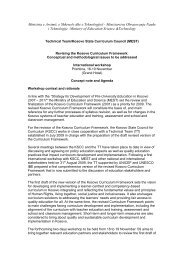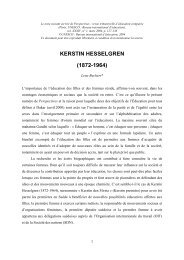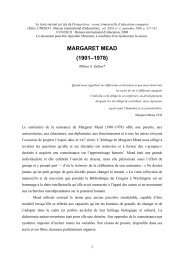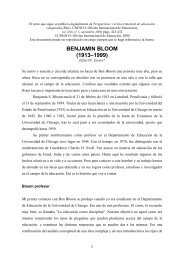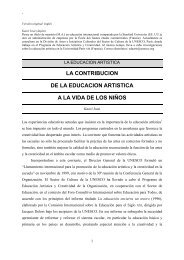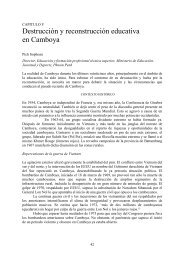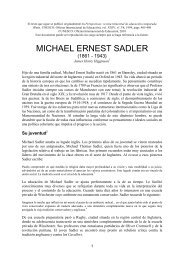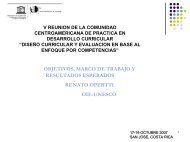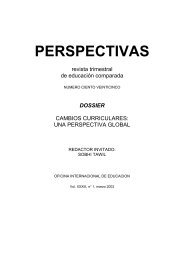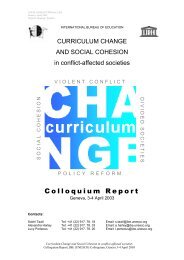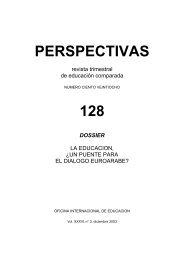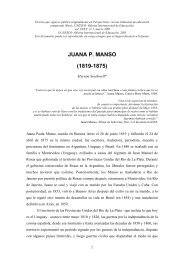MISKAWAYH - International Bureau of Education - Unesco
MISKAWAYH - International Bureau of Education - Unesco
MISKAWAYH - International Bureau of Education - Unesco
Create successful ePaper yourself
Turn your PDF publications into a flip-book with our unique Google optimized e-Paper software.
Miskawayh sets forth a number <strong>of</strong> rules <strong>of</strong> etiquette (adab) connected with the external<br />
appearance and the general image <strong>of</strong> the virtuous human being in his society, to all <strong>of</strong> which the<br />
boy must be brought up and accustomed. He must not spit when in company, nor blow his nose,<br />
nor yawn in the presence <strong>of</strong> others; he must not cross his legs, nor put his hand beneath his<br />
beard, or support his head between his hands, because to do these things is a sign <strong>of</strong> laziness.<br />
Concerning the ethical aspect, Miskawayh mentions another collection <strong>of</strong> rules <strong>of</strong><br />
etiquette which the boy must grow up with, as a kind <strong>of</strong> personal virtues, which are related to<br />
his dealings with others: for example, never to swear, whether truthfully or falsely, for that is<br />
disgraceful for men, though it may sometimes be necessary. In addition to not swearing, the boy<br />
must be accustomed to talk only a little, and only in reply to questions. He must become used to<br />
listening to those older than himself, and keeping silence before them; he must be prevented<br />
from saying anything evil, from uttering insults, curses, or foolish talk; he should be encouraged<br />
to fine and elegant speech, to greet others in a graceful fashion. 50<br />
The boy must also become used to obeying his parents, teachers, and trainers: he should<br />
regard them with respect and honour, and fear them. If the teacher chastises him, the boy must<br />
learn not to show pain, so he must not cry out nor ask anyone to intercede for him; for such is<br />
the conduct <strong>of</strong> servants or slaves without fortitude.<br />
It is vital also that the boy be accustomed to serve himself and his teacher and all who<br />
are older than him; however, it is in particular those boys who are the sons <strong>of</strong> the wealthy and<br />
affluent who most need to be brought up and habituated to this conduct.<br />
Despite all that has been indicated, the person who cares for the boy and undertakes his<br />
training has the duty to give him the opportunity for rest, and also must be kind to the boys and<br />
reward them for good conduct with something better.<br />
Miskawayh transmits all this as it is sometimes, but sometimes changes it somewhat and<br />
expands what he takes over, in a style much finer than that <strong>of</strong> the Arabic translation in the<br />
manuscript kept in the Egyptian National Library. 51<br />
It is most likely that Miskawayh did not continue to copy from the Greek philosopher<br />
Bryson, but rather that he added material <strong>of</strong> his own which he considered completed what he<br />
borrowed; and these opinions were influenced either by his personal experience or by his<br />
Islamic environment.<br />
Some <strong>of</strong> the opinions he sets forth confirm his awareness <strong>of</strong> the importance <strong>of</strong> the early<br />
stages <strong>of</strong> human maturing, or the early stages <strong>of</strong> growth, for on these are built many<br />
characteristics in the person’s future life, as is well known nowadays. If this is the case, it<br />
confirms the importance <strong>of</strong> the first years in the boy’s upbringing, and the influence <strong>of</strong> the<br />
environment on his character in particular; and in the light <strong>of</strong> his personal experience, he makes<br />
deductions regarding what went before. This is clear in his reference to the virtuous kings <strong>of</strong><br />
Persia, who used not to educate their sons among their retinue, their servants, and their<br />
companions, for fear that they should be influenced by them. For this reason, the Persian kings<br />
used to send their sons in the company <strong>of</strong> trustworthy men to distant regions where their<br />
education was undertaken by tough people living a harsh life, who did not know luxury or ease.<br />
These kings <strong>of</strong> Persia were imitated by many <strong>of</strong> the powerful leaders in the Abbasid caliphate at<br />
that time, who would remove their sons to distant places, so they could grow up in their<br />
character far from the people and customs in wicked countries. 52<br />
Being at some distance from his teachers the Greeks, he quite soon differed from them;<br />
inasmuch as he states that the first <strong>of</strong> all teachings is the Shari c a, which must be inculcated into<br />
the human being while young. That is because the foundation on which character is built later is<br />
the Shari c a, and as Miskawayh affirms, it is: ‘that which reforms the young and accustoms them<br />
to good deeds, and prepares their souls to accept wisdom and seek virtues and reach human<br />
happiness, with sound thought and correct reasoning’. 53 This being so, the responsibility for<br />
11



